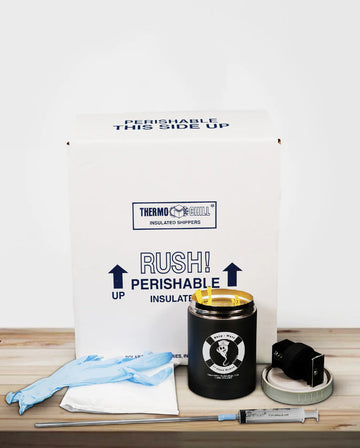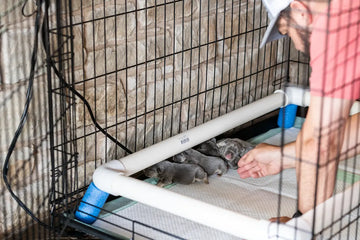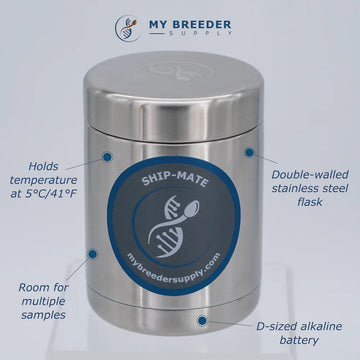The Importance of Giardia Testing for Dogs: Protecting Their Health
by Phenyx Media on Jun 29, 2023

Introduction: Giardia and Dogs
The bond between humans and dogs is one of a kind - a bond of love, care, and mutual dependence. As devoted pet owners, ensuring our furry friends' health becomes a paramount duty. In our quest to protect them, one microscopic enemy that we need to be wary of is Giardia. A prevalent cause of diarrheal disease, Giardia poses a significant risk to our canine companions. This article aims to shed light on this parasite and underline the importance of regular Giardia testing for dogs.
What is Giardia?
Giardia, in layman's terms, is a tiny parasite that infects the intestines of various animals, including dogs. It leads to an illness known as giardiasis, characterized by symptoms like diarrhea, vomiting, and weight loss. Unfortunately, Giardia is quite common and is a leading cause of diarrhea in dogs.
Life Cycle of Giardia
Giardia has a complex life cycle consisting of two stages - trophozoites and cysts. Trophozoites are the active, disease-causing stage, residing in the host's intestines. On the other hand, cysts are the dormant stage, expelled in the host's feces, and can survive in the environment for several months.
How Giardia Impacts Canine Health
When a dog ingests Giardia cysts from contaminated sources, the cysts reach the intestines and transform into trophozoites. These trophozoites attach to the intestinal wall, causing inflammation, malabsorption of nutrients, and diarrhea.
Giardia in Dogs: How do They Get Infected?

Dogs, especially puppies and those with compromised immune systems, are susceptible to Giardia infection. The primary mode of transmission is the fecal-oral route, where dogs ingest Giardia cysts from contaminated sources.
Common Sources of Infection
Sources of infection include contaminated water, food, feces-infected surfaces, or other infected animals. The presence of Giardia in the environment underscores the need for regular and thorough cleaning of your pet's living area.
Giardia’s Impact on Dogs’ Behavior
Giardiasis can lead to discomfort and changes in your dog's behavior. An infected dog may show a decrease in activity, reluctance to eat, and signs of abdominal discomfort.
Symptoms of Giardia in Dogs
Symptoms vary in severity, with some dogs showing no signs of infection despite being carriers. However, most infected dogs will exhibit symptoms that pet owners should be on the lookout for.
Subtle and Severe Symptoms
Common signs include chronic or intermittent diarrhea, soft, greasy stools, weight loss, reduced appetite, and lethargy. In severe cases, the dog might become dehydrated due to persistent diarrhea.
Chronic Cases and Long-Term Effects
If untreated, Giardia can lead to chronic health problems, including malnutrition, weight loss, and overall poor condition. Hence, prompt diagnosis and treatment are vital.
Importance of Giardia Testing in Dogs

Regular testing for Giardia is essential in ensuring the overall health and well-being of your canine friend.
Early Detection and Effective Treatment
Testing allows for early detection, enabling prompt treatment. The sooner Giardia is diagnosed, the quicker and more effectively it can be addressed, mitigating the risk of long-term health impacts.
Controlling the Spread
Giardia testing is also crucial for preventing the spread of the parasite to other pets and even humans in the household. Remember, an infected dog can shed Giardia cysts, making everyone around susceptible.
Common Tests for Giardia in Dogs
Several tests are available to diagnose Giardia in dogs.
Direct Smear
This involves examining a fresh fecal sample under a microscope. It's quick but not as reliable, as it might miss infections with low numbers of cysts.
Fecal Flotation
Here, the fecal sample is mixed with a solution that causes Giardia cysts to float. The solution is then examined under a microscope. It's more reliable than a direct smear but can still miss low-level infections.
ELISA Test
This test looks for Giardia antigens (proteins produced by the parasite) in the feces. It's highly sensitive and can often detect infections that other tests miss.
PCR Testing
PCR (polymerase chain reaction) testing identifies Giardia DNA in the feces. It's the most accurate test and can detect even low-level infections.
Treatment Options for Giardia in Dogs
The treatment for giardiasis in dogs generally involves medication, along with supportive care.
Pharmaceutical Treatments
Veterinarians commonly prescribe antiprotozoal drugs to kill the Giardia parasites. Metronidazole and Fenbendazole are frequently used, either separately or in combination.
Home Care and Recovery
Supportive care includes keeping your dog hydrated and feeding a bland, easily digestible diet. Regular follow-ups with the vet are necessary to ensure complete recovery.
Preventing Giardia Infection in Dogs
While it's not always possible to prevent Giardia infection, there are steps you can take to reduce your dog's risk.
Clean Environment
Maintain a clean environment. Regularly clean and disinfect your pet's living area, and remove feces promptly.
Regular Check-ups
Regular veterinary check-ups can catch an infection early, even before symptoms appear.
Vaccination and Medication
While there's no vaccine for Giardia, some medications can help control Giardia infection, especially in kennels or multi-dog households.
Conclusion
Giardia is a common parasite that poses a significant threat to our dogs' health. Understanding its impact and recognizing the symptoms can aid in early detection and treatment. Regular testing for Giardia is a responsible and vital part of pet ownership, helping ensure the well-being of our canine companions.
FAQs On Giardia
Can Giardia in dogs spread to humans?
Yes, Giardia is a zoonotic parasite, which means it can be passed from animals to humans. However, the specific types of Giardia that infect dogs are not the most common ones that infect humans.
Is there a vaccine for Giardia in dogs?
Currently, there's no vaccine available to prevent Giardia infection in dogs.
Can a dog get Giardia more than once?
Yes, a dog can get re-infected with Giardia if they ingest the parasite again after treatment.
What should I do if my dog has been diagnosed with Giardia?
If your dog has been diagnosed with Giardia, follow the treatment plan prescribed by your vet. Keep your pet hydrated, feed a bland diet, and maintain a clean environment to prevent re-infection.
How long does it take for a dog to recover from Giardia?
With proper treatment, most dogs recover from Giardia within a few weeks. However, recovery time can vary based on the severity of the infection and the dog's overall health.




